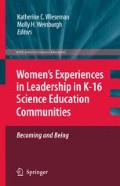This chapter presents the story of Meta, an egalitarian leader who is growing to understand her leadership style and the life forces that contribute to its development. These forces include, but are not limited to faith and theology (Hoare, 2000) the ethic of care (Noddings, 1992), transformative learning (Mezirow, 1997), and nature of science (NOS) (Lederman & Lederman, 2004; McComas, 1998). This ethnographic study of an individual revealed that ways of knowing and operating that once were intuitive have become deliberate. These forces are belief structures which guide Meta’s decisions as she makes career choices and are afforded/accepted multiple opportunities to lead.
Access this chapter
Tax calculation will be finalised at checkout
Purchases are for personal use only
Preview
Unable to display preview. Download preview PDF.
Reference
American Association for the Advancement of Science [AAAS]. (1993). Benchmarks for science literacy. New York: Oxford University Press.
Ashkanasy, N. M. (2007). The Australian enigma. In J.Chhokar, F. Brodbeck, and R.J. House (Eds.), Culture and leadership across the world: The GLOBE book of in-depth studies of 25 societies (pp. 299–334). Thousand Oaks, CA: Sage Publications.
Bass, D. (1997). Practicing our faith. San Francisco: Jossey-Bass, Inc.
Brennen, A, (1996). Article and resources on educational administration and supervision. Leadership styles. Retrieved February 29, 2008, from http://www.soencouragement.org/leadership-styles.htm
Cohen, J. (2001). Social and emotional education: Core concepts and practices. In J. Cohen (Ed.), Caring classrooms: Intelligent schools (pp. 3–29). New York: Teachers College Press.
Cranton, P. (1994). Understanding and promoting transformative learning: A guide for educators of adults. San Francisco, CA: Jossey-Bass.
Hoare, T. (2000). Facts about Friends. Retrieved on November 19, 2007, from http://www. quaker.org/friends.html.
Imel, S. (1998). Transformative learning in adulthood. Washington, D.C.: Office of Educational Research and Improvement. (ERIC Document Reproduction Service No. ED42326).
Lederman, N. (2006). Syntax of nature of science within inquiry and science instruction. In L. G. Flick & N.G. Lederman (Eds.), Scientific inquiry and nature of science (pp. 301–318). Netherlands: Springer.
Lederman, N., & Lederman, J. (2004). Revising instruction to teach nature of science. Modifying activities to enhance student understanding of science. The Science Teacher, 71(9), 36–39.
Lipman-Blumen, J. (1997). Connective leadership-a new paradigm. Drucker Magazine, 1(1), 12–19.
McComas, W. (1998). The principle elements of the nature of science: Dispelling the myths. In, W.F. McComas, (Ed.), The nature of science in science education rationales and strategies (pp. 53–72). Netherlands: Kluwer.
Mezirow, J. (1997). Transformative learning: Theory to practice. In P. Cranton (Ed.), New directions for adult and continuing education: No. 74. Transformative learning in action: Insights from practice (pp. 5–12). San Francisco, CA: Jossey-Bass.
Mezirow, J. (2000). Learning as transformation: Critical perspective on a theory in progress. San Francisco, CA: Jossey-Bass.
Noddings, N. (1984). Caring, a feminine approach to ethics and moral education. Berkeley: University of California Press.
Noddings, N. (1992). The challenge to care in schools: An alternative approach to education. New York: Teachers College Press.
Noddings, N. (2001). Care and Coercion in School Reform. Journal of Educational Change, 2(1), 35–43.
Teven, J., & McCroskey, J. (1997). The relationship of perceived teacher caring with student learning and teacher evaluation. Communication Education, 46(1), 1–9.
Thompson, E. (1994). Fair enough: Egalitarians in Australia. Sydney: Allen & Unwin.
Author information
Authors and Affiliations
Editor information
Editors and Affiliations
Rights and permissions
Copyright information
© 2009 Springer Science+Business Media B.V.
About this chapter
Cite this chapter
Van Sickle, M., Cudahy, D. (2009). Laying the Ladder Down: Egalitarian Leadership. In: Wieseman, K.C., Weinburgh, M.H. (eds) Women’s Experiences in Leadership in K-16 Science Education Communities. Springer, Dordrecht. https://doi.org/10.1007/978-90-481-2239-4_12
Download citation
DOI: https://doi.org/10.1007/978-90-481-2239-4_12
Publisher Name: Springer, Dordrecht
Print ISBN: 978-90-481-2236-3
Online ISBN: 978-90-481-2239-4
eBook Packages: Humanities, Social Sciences and LawHistory (R0)

